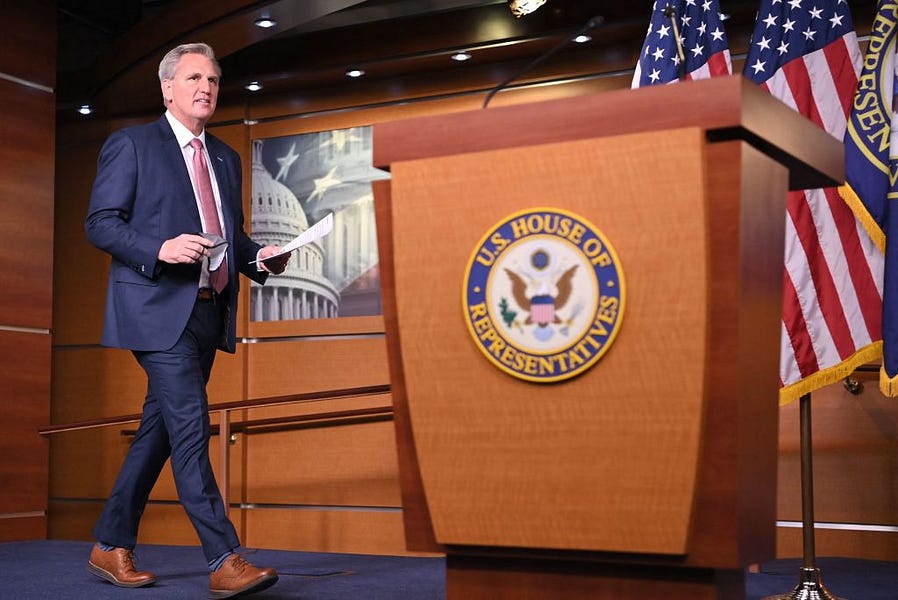Good morning. We’ll get back to some interesting policy stories next week, but for today’s Uphill, we thought it was time to take a look at the current House GOP conference and how leaders have handled the fringiest members in their ranks this year. (Spoiler: not very forcefully.)
Is McCarthy Willing (or Able) to Keep Members in Line?
When Rep. Paul Gosar spoke at a conference organized by a white nationalist last month, House GOP leaders released statements publicly refuting racism. But that was about as far as they went in responding to it. Gosar did not face any real consequences for his decision to attend.
The event Gosar spoke at was put together by far-right personality Nick Fuentes, a white nationalist who was at the deadly 2017 rally in Charlottesville and was outside the U.S. Capitol on January 6. (He claims he did not go inside the building.) Gosar discussed immigration and social media during his remarks. Fuentes spoke after the congressman, arguing that the United States needs a white demographic majority and praising the mobbing of the Capitol.
“I saw hundreds of thousands of patriots surrounding the U.S. Capitol building, and I saw the police retreating, and we heard that the politicians voting on the fraudulent election had scurried to their underground tunnels away from the Capitol,” Fuentes said. “I said to myself: ‘This is awesome!’”
He added: “To see that Capitol under siege, to see the people of this country rise up and mobilize to D.C. with the pitchforks and the torches—we need a little bit more of that energy in the future.”
Gosar later distanced himself from Fuentes’ racist statements and his comments about the Capitol attack. Still, he defended the decision to accept the invitation, saying he wanted to reach out to younger voters.
“We thought about it, and we thought: There is a group of young people that are becoming part of the election process and becoming a bigger force,” Gosar told the Washington Post. “So why not take that energy and listen to what they’ve got to say?”
But this wasn’t a one-off: Gosar had been involved with extreme groups, including those who organized the Stop the Steal movement, long before attending the February event. One far-right activist and conspiracy theory-mongerer, Ali Alexander, claimed he “schemed up” the idea for the January 6 rally in DC alongside Gosar and two other House Republicans. Both of the other members he mentioned—Reps. Andy Biggs and Mo Brooks—said in statements they did not recall interacting with Alexander. Gosar was the only one of the three who did not refute Alexander’s remarks at the time. Gosar had interacted with Alexander on Twitter leading up to the rally and he spoke at a Phoenix event beforehand that Alexander helped put together.
And when members of the mob were breaking past barricades and police lines on January 6, Gosar tweeted a photo of rioters scaling the Capitol and asked supporters not to get carried away. “If anyone on the ground reads this and is beyond the line come back,” he wrote. But on the now-defunct conservative social media platform Parler, Gosar shared a different message alongside the same photograph: “Americans are upset,” he said.
Gosar was the only elected official to appear at Fuentes’ conference. Former Rep. Steve King, whose long history of racist comments ultimately led to him being kicked off of his committees in 2019 and later losing his seat in the House, also spoke at the event.
It was merely the latest in a series of instances this year that have left some Republicans wondering where the line is between acceptable—or at least easily overlooked—behavior and behavior that requires a response from leaders within the House GOP conference.
House GOP Leader Kevin McCarthy and Republican Whip Steve Scalise were quiet about the situation, staying away from directly addressing Gosar’s decision to attend. Some House Republicans were surprised to see that instead of taking any action to limit Gosar’s influence, McCarthy retweeted a Gosar tweet to his 1.2 million followers just a couple days later.
House GOP Conference Chair Liz Cheney has been trying to carve out a different path for the party. Gosar’s appearance at Fuentes’ conference came just days after Cheney publicly made the case for Republicans to repudiate those behind the Capitol attack more forcefully.
“It’s very important for us to ignore the temptation to look away,” Cheney, the third-ranking Republican in the House, said at an event hosted by the Reagan Institute. “And it’s very important, especially for us as Republicans, to make clear that we aren’t the party of white supremacy.”
“You saw the symbols of Holocaust denial, for example, at the Capitol that day. You saw the Confederate flag being carried through the rotunda, and I think we as Republicans in particular have a duty and an obligation to stand against that, to stand against insurrection,” she said.
Asked later about Gosar’s attendance at the event, Cheney gave the most forceful response of the top House Republicans. She said the organization behind it is “clearly racist” and told reporters it was not the kind of conference that lawmakers should be participating in.
The episode has led some members to question McCarthy’s approach to keeping the conference together despite deep divisions between its different factions. McCarthy has tried to navigate the divide by making room for people like Gosar and people like Cheney, who faced backlash from Trump’s most ardent supporters after she supported impeaching him for inciting the attack on the Capitol.
“This Republican Party’s a very big tent,” McCarthy told reporters after a lengthy GOP conference meeting during which members voted to support Cheney in February. “Everyone’s invited in. And you look at the last election, we continue to grow—and in two years we’ll be in the majority.”
While many Republicans agree that a big tent is a positive, some think the party would benefit if the tent were … a little smaller. McCarthy has displayed a profound sense of tolerance this year for members who spout malicious falsehoods and align themselves with extreme groups—raising questions about how he will keep members in line if he becomes House speaker in 2023.
It’s not like Republicans haven’t disciplined their own for going against leadership’s will in the past. In 2012, then-Speaker John Boehner and his leadership team moved to strip former Rep. Justin Amash and another conservative member, former Rep. Tim Huelskamp, from the House Budget Committee. That came after the two voted differently than then-House Budget Committee Chairman Paul Ryan on a budget proposal. Leaders also kicked Rep. Dave Schweikert off of the Financial Services Committee, a move Schweikert said he was told came because he did not vote in lockstep with leadership.
Those squabbles over economic policy and the legislative process seem quaint in comparison to the challenges House Republicans face today: There are a growing number of extreme voices in the conference, and they are proving a powerful contingent of the party. If you think they don’t have much influence, just recall that the effort to challenge Electoral College results from several states started small, with a few House Freedom Caucus members urging their colleagues to sign onto the effort lest they provoke former President Donald Trump’s rage. Nearly two-thirds of the conference ultimately supported the hardliners’ push to overturn the election—just hours after the Capitol had been ransacked by violent Trump supporters.
When then-Senate Majority Leader Mitch McConnell was urging his conference not to throw its weight behind the House GOP’s Electoral College scheme, McCarthy was quietly telling his members that the vote to object to the state results was easy—emphasizing they’d avoid backlash from the base and arguing the vote would not matter in the end anyway because the election would not actually be overturned.
McCarthy made that case again on Thursday, telling reporters the two states Republicans challenged would not have been enough to overturn Joe Biden’s Electoral College victory.
“If you remove Arizona and Pennsylvania, President Biden is still president. He’s above 270. So that premise is wrong,” McCarthy said. His version of events is revisionist history, though: Prior to the attack on the Capitol, Republicans had been prepared to challenge additional states, including Michigan, Nevada, and Wisconsin.
At one point, McCarthy seemed more willing than former House Speaker Paul Ryan to punish the fringiest members of the conference. In 2019, McCarthy removed former Rep. Steve King from his committee assignments after King made one racist comment too many. King had questioned during an interview with the New York Times why the phrases “white nationalist, white supremacist, Western civilization” were seen as offensive.
But McCarthy didn’t take a similar approach when confronted this year with Georgia Rep. Marjorie Taylor Greene. He expressed concerns about past instances of bigoted rhetoric during her primary race, but once she had won, he defended her against questions about her support for QAnon and urged reporters to give her a chance.
And when CNN reported this year that Greene had indicated support online for executing top Democrats and she had promoted false theories that school shootings had been faked (with video later emerging of her berating a teenaged school shooting survivor)—among other unhinged statements—McCarthy declined to take action to limit her influence. Faced with pressure from Democratic leaders, McCarthy offered to merely swap Greene’s position on the House Education and Labor Committee for a spot on the House Small Business Committee.
His refusal to strip her of her committees as he did with King led to a full House vote on the matter—putting rank-and-file Republicans in an uncomfortable position. Most sided with GOP leadership, who argued that because her comments came before she was a member of Congress, they should be viewed differently than King’s, and that the power to make committee decisions should remain with the leaders of each respective party. But 11 Republicans, many of them from New York and Florida thanks to her comments about the Parkland school shooting and her remarks lending credence to a 9/11 conspiracy theory, voted alongside Democrats to remove her from the panels.
Rep. Fred Upton, one of the members who voted for the move, told The Dispatch this week that he thought McCarthy should have made the call himself to remove her from her committees. But when asked if he is worried going forward that McCarthy will give too much room for extreme rhetoric within the conference, Upton declined to criticize him more assertively.
“Well, I guess, you know. I don’t know. I’m not focused on it,” Upton said.
The problem isn’t going away, though. Greene, now with more time on her hands than most members, has continued to make trouble for rank-and-file House Republicans.
In recent weeks, she has repeatedly offered motions to adjourn the House—a move that pauses business and leads to an unexpected, more than hourlong vote to keep the chamber in session. Most Republicans have sided with Greene on the votes, but her colleagues have become increasingly frustrated with the obstruction tactic. Last week, 40 voted against her motion to adjourn, arguing the move is disrupting business like hearings and meetings with constituents. More have raised complaints about it privately.
The group of 40 dissenters included members from across the ideological spectrum. Greene labeled the Republicans who opposed her the “40 white flags of the Surrender Caucus” in a release.
“By voting against my motion to adjourn, some of my Republican colleagues are siding with the Democrats and enabling their policies that will destroy America,” she said. (The motion to adjourn would have failed regardless of how the 40 Republicans voted. Democrats, who control the chamber, have been unified in opposing her efforts.)
“Apart from thinking ‘40 White Flags of the Surrender Caucus’ sounds poetic, I really couldn’t care less,” responded Rep. Peter Meijer, a Michigan freshman who voted against the motion to adjourn.
And Wisconsin Rep. Mike Gallagher, who also voted against Greene, criticized the nature of the obstruction tactic: “My position is that Congress adjourns too frequently. We don’t work,” he said.
Greene and members of the House Freedom Caucus have also ground work to a near halt on suspension bills—measures that are so uncontroversial they typically pass under expedited procedures, without a full roll call vote in the chamber. This has hurt bills sponsored by Republicans, too. House Majority Leader Steny Hoyer has said he is working with McCarthy to find a path forward on the matter.
During a GOP conference meeting on Wednesday, a senior House GOP aide told The Dispatch, McCarthy said Republicans should have a unified strategy for obstruction tactics like the ones Greene has been using and that a larger discussion about it is in order. Rep. Andy Biggs, a member of the Freedom Caucus, rejected McCarthy’s more tailored approach and made clear that the group is going to do what it wants.
It’s not clear how McCarthy could crack down on the members for slowing down the floor—or if he will take action at all, given his past inclination toward lenience. He could also drag out the problem and ultimately leave it up to Democrats to address. Hoyer told Democrats on a call this week that they will have resolved the GOP obstruction “via negotiation or by a change to the rules.”
Either way, members from both parties are getting impatient.
“The level of frustration and annoyance with these antics speaks for itself,” the GOP aide said.







Please note that we at The Dispatch hold ourselves, our work, and our commenters to a higher standard than other places on the internet. We welcome comments that foster genuine debate or discussion—including comments critical of us or our work—but responses that include ad hominem attacks on fellow Dispatch members or are intended to stoke fear and anger may be moderated.
With your membership, you only have the ability to comment on The Morning Dispatch articles. Consider upgrading to join the conversation everywhere.